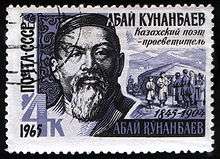Kazakh literature
Kazakh Literature expands from the current territory of Kazakhstan, also including the era of Kazakh Soviet Socialist Republic, Kazakh recognized territory under the Russian Empire and the Kazakh Khanate. There is some overlap with several complementary themes, including the literature of Turkic tribes that inhabited Kazakhstan over the course of the history and literature written by ethnic Kazakhs.

Medieval Literature
According to Chinese written sources of 6th-8th centuries CE, Turkic tribes of Kazakhstan had oral poetry tradition. Traces of this tradition are shown on stone carvings dated 5th-7th centuries C.E. that describes rule of Kultegin and Bilge, two early Turkic rulers ("kagans").
Book of Dede Korkut and Oguz Name (a story of ancient Turkic king Oghuz Khan) are the most well-known Turkic heroic legends. Initially created around 9th century CE, they were passed on through generations in oral form. The legendary tales were recorded by Turkish authors in 14-16th centuries C.E.
Abay Kunanbayev
The preeminent role in the development of modern literary Kazakh belongs to Abay Qunanbayuli (or Kunanbayev, Kazakh: Абай Құнанбайұлы) (1845–1904), whose writings did much to preserve Kazakh folk culture. Abay's major work is The Book of Words (Kazakh: қара сөздері, Qara sözderi), a philosophical treatise and collection of poems where he criticizes Russian colonial policies and encourages other Kazakhs to embrace education and literacy.